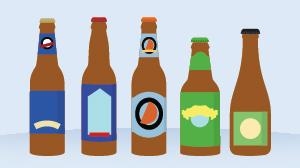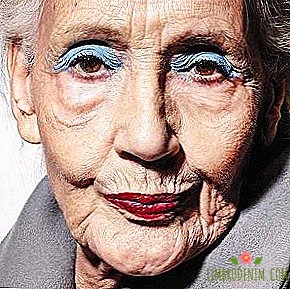"If I don't want fitness, that's my business": I wrote a book about food, sex, and body
Eating disorders - A common and dangerous problem: according to statistics, mortality from anorexia is higher than from other mental states. But if it is precisely frustration that most seem to be something distant, then many have an uneasy relationship with food and their own body. We spoke with Yulia Lapina, a clinical psychologist, author of the book Body, Food, Sex and Anxiety (the author transferred the entire fee to the children's hospice House with a Lighthouse) about what affects the eating habits and attitudes of Russians with food, why women more often dissatisfied with their bodies, as well as bodybuilding and related myths.

My first profession, oddly enough, an engineer-economist. My own therapy and the fact that I learned about myself and other people in her process prompted me to get a second education - with a clinical bias. In general, it seems to me that life experience is important for practical psychology. Since I went through psychotherapy in Switzerland, there I continued to study - I did a Russian diploma later. I saw how people and their peculiarities are treated abroad, and this gave me the opportunity to work with people in Russia on a different level.
Many of the things that we have now happening, Europe has long experienced. If we talk about eating disorders, domestic violence, traumatic children's experience, there is another society; this occurs, but is considered as an exception to the rule. Therefore, the methods used in these countries do not always work on our people, they are designed for people with a different background.
I saw one of my tasks in adapting working methods to people who, for example, faced psychology and psychotherapy for the first time. Abroad is a familiar area. Even in large cities, this is still an exception, and the first steps should be related to psycho-education.
About the work on the book
The book was born from a blog on Facebook - I started to lead it by chance. When I worked in "Intueat", we chose a platform for communication with colleagues. I made a Facebook account, began to share my thoughts, I saw that there was a response. When I was told a hundred and twenty-five times that I needed to write a book, I thought that I would never do that. But then I met Nadezhda Kazakova and realized that I just needed a manager, a deadline and a signed contract. Formally, the work took about a year. We agreed that the book will overlap with the blog, but will not be a collection of articles. It consists of three parts - about the body, food and sex.
Practical stories are mentioned in the book very casually, with quotations from anonymous forums. The insights that I had during the sessions, the things that people shared, turned into the ideas of the book. But direct quotes and session recordings are very difficult ethically and legally. I know that some people do this, take the written consent of clients - then it happens that, having seen it in the text, especially with the comment, clients are dissatisfied, and this interferes with the therapeutic process. We decided to immediately move away from this idea. This is more of a scientific review - with links, examples and quotes taken from anonymous sources.
Of course, the book is largely based on foreign material and foreign statistics, because with Russian analytics everything is difficult. We do not have government programs to help patients with eating disorders. There is a textbook on psychiatry Zharikova - an official textbook for medical schools, - and there is only one and a half page about anorexia. Some of our psychiatrists say that anorexia does not exist at all and in fact it is schizophrenia. Statistics, in fact, is not conducted - sometimes patients make other diagnoses.
There are no practical tips in the book. To make it practical is to load very much, and everything is very individual. Sometimes an eating disorder occurs on its own, sometimes it is a symptom of a more complex disorder. But whatever the human situation, awareness and understanding of the context is an important first step.
On the attitude to the body in Russia
When we talk about the situation in other countries, it is difficult to summarize here. Besides the fact that there is a huge difference between America and Europe, inside Europe there is Italy with the cult of food, there are northern countries, where it is also believed that there should be a lot of food and it should be nourishing, but there is England that is obsessed with fitness and healthy of life.
In Russia, too, not everything is homogeneous. I dare say that the turbulence that occurred with Russia was not in any country in the world. In a short time, the ideology has changed dramatically, just over a century, the country has shaken: first the fall of imperial Russia, then the first builders of communism, crackdown, war, famine, repression, then a sudden fall and collapse. And all the generations that have seen it are still alive. Naturally, this can not affect the attitude to the body and ideas about food within the family.
Generally speaking, the first difference between Russia and other countries is a huge difference between generations. People who were born ten, twenty, thirty years ago are very different. The search for something sustainable, the search for control is much more relevant here, precisely because our experience assures us: we have something to fear, everything is unsteady and changeable. The idea of food control, proper nutrition, and how we look is strengthened where there is a lot of anxiety, including the provoked environment.
On the one hand, our grandparents survived the years of hunger and feed their grandchildren a lot, and on the other, they are already sufficiently infected with new fears: what if my daughter or granddaughter is fat, that is, socially unacceptable? Very often there are double messages. When grandmother meets her granddaughter and says: "Oh, how you are stout," - and after five minutes adds: "Sit down, eat pies".
You hope that by investing money, time and energy in it, you will receive dividends in the form of love, respect and acceptance, or money, because it will help your career growth.
The first step in the work is awareness. Even just to think about who I am, what food rules in my family, what I was forbidden, what they allowed. For example, sweets for the child were taboo, parents were very afraid that he would eat sweets. Moreover, when they celebrated their birthday in kindergarten or school, he ate all the sweet things he could. The ban creates desire. The rules by which a person acts can be very different, but fear and the desire to control at least something really occurs when there is a lot of chaos around - at the level of the country, family, relationships, internal level. Hunger and food control soothe this chaos.
Women are more likely to experience a painful attitude towards the body, since for too long a body for a woman was a way to exist in this world. She was deprived of her rights for a long time, and this was her only commodity for which she could exchange something. And I would consider this much broader than the sexual context - starting with what the cute, pretty girl can “offer” to her parents. There is unconditional parental love (and this is quite a rare phenomenon), but there is how parents look at the child. How are boys praised? "How awesome you did!" How are girls praised? "What are you pretty!" Deprived of praise, she realizes that something is wrong with her. Moreover, the employer also pays attention to the appearance of the woman. Therefore, in fact, many investments of women in their appearance are in some sense a business. You hope that by investing money, time and energy in it, you will receive dividends in the form of love, respect and acceptance, or money, because it will help your career growth.
Offhand, 90% of women who come to the therapist have difficulty perceiving their own body and themselves. In English, there is an eating disorder and disordered eating - eating disorders and a broken relationship with food that do not reach a clinically significant picture. Disordered eating is quite common - at least, for example, when a person tries to do a couple of fasting days on kefir, and then overeats sweet. Even if you chose a client and he came to you, for example, with a difficult situation in the family, you suddenly can see that he has control over the food as control over this chaos, then the most disordered eating. At a minimum, any therapist should have a superficial knowledge of eating disorders.
About blogs and "traditional" media
I started Facebook to just share my thoughts. After I led the groups in Intuit, I wanted to continue supporting people with information. In a toxic environment, when criticism pours around, endless “prepare the body for the summer,” I wanted to organize a space that would support the graduates of the group.
With the telegram channel it turned out interesting. First, some things are easier to explain there, especially if you post photos that Facebook finds too "frank." Secondly, it is very interesting from a therapeutic point of view. The fact is that Facebook is famous for its comments. I bath only explicit trolls, advertising or rudeness with the transition to the individual. I almost do not delete the statements, even if they are very sharp - this is the real world. It is also important to communicate delicately with these commentators in order to show them the possibilities of constructive dialogue. In addition, responding to their attacks, you help a person to look for arguments in an argument with an inner voice. But sometimes readers get tired - and telegrams are wonderful because you can post there without comment. The channel is primarily a space for people who are either undergoing therapy, or have completed it, but need support, as well as a platform for informational support for the book.
I think that the victory in the struggle between “traditional” media and blogs will be in a variety. The question of media and consciousness is complex. Chicken and egg - what comes first? Is it the media that forms the consciousness or do people ripen to certain processes, and the media anticipate and reflect them? Where is this line: did you impose what you like, or were you subconsciously ready for the fact that you would like it?
Earlier, when there was no Internet, glossy magazines were in kiosks: how to take photos of models in them - this is how you will see a woman’s body. Both today and tomorrow there will definitely be glossy blogs, glossy models, fitness blogs, fitness models, people obsessed with their bodies. The difference is that they will be one of many. Everyone, possessing a certain idea, strength, time and talent, can keep his journal. In the same telegram there are blogs for the most varied tastes - not only about body-positive, but also about sexual orientation, cooking, foolish humor, or with serious analytical articles. Among them will be anti-bi-positive, but there are many alternatives. I see it as a win of opportunity.
About bodypositive and fetching
It seems to me that up to 90% of the critics of body repository did not convey the idea well - in the end, they misunderstood something or settled on stereotyped ideas. The story of “promoting unhealthy lifestyles” is a stereotype of the past thinking that it’s easy to propagandize. Supposedly you say: "You can eat two hundred buns," and that's it. You do not eat them, because you really do not want. It’s like advocating drinking milk: if you don’t love it, it’s impossible. In the idea of propaganda, there is an idea of people as insensible creatures who, as soon as they heard something, immediately ran to do it. Relationship with the body is much more complicated.
Plus the idea of bodypositive is that we control the body much less than fitness bloggers think. Each person can be in different moments of life with a very different body: aged, plump, thinner. What will he do with it - wait until the bright future comes? And if it never comes? Life is happening now, and tomorrow may not be. And if all your energy, time, money goes to get rid of the crease or cellulite, then the body positive raises the question: is it such a good investment?
What to do if you will never have such a body, which was at the age of sixteen? This is very sad for some truth, but with its acceptance a completely different life can begin. The idea that we are in complete control of our body, we simply try hard, this is propaganda of the diet industry. This is an example of many women with eating disorders eating 1200 calories per day and still terribly dissatisfied with their bodies. The main message of the body positive is “My body is my business”. If I want to lose weight - this is my business and my responsibility. And in the same way, if I say that I now have other priorities than fitness and broccoli for a couple, then this is again my business, my responsibility, and other people have no right to tell me how it should be.
This is the trap of the fatfobia: the question is not about health and not about the norm, but about the installation “You are to blame”. Instead of help and sympathy from a person, move away
It is often said: "It is normal to be full if it is not obese." Okay, and if it's obesity, then what? First, the diagnosis of obesity is not so simple. It was adopted relatively recently, and the American Medical Association was a big controversy. Obesity is more a symptom than a diagnosis. Like a headache, behind which can be brain cancer, migraine, high blood pressure and headache during menstruation. Even turning a blind eye to the fact that the criterion of BMI is a convention, questions remain about what lies behind the symptom of obesity. From eating disorders to endocrine disorders.
The idea of reducing obesity to a diagnosis, which is explained only by the fact that you eat a lot, is a big problem. Firstly, because it is not true. And secondly, because you have to watch what happens with a person’s appetite. What makes him eat more than his energy needs?
With any other chronic disease, such as multiple sclerosis, we also say that it does not fit into the norm, we understand that it happened to a person. As for obesity, there is a very strong point of view that this did not happen to a person, and this is his fault. Although at the same time we have no questions for a person who uses drugs and alcohol from morning to evening at the disco, but he looks normal. We do not worry about his health. This is the trap of the fatfobia: the question is not about health and not about the norm, but about the installation “You are to blame”. Instead of help and sympathy from a person, move away. OK, we call it a disease - but are we pushing a person away or are we looking for its causes? We consider it a disease, but we do not treat it as a disease. We sympathize with a person with cancer, multiple sclerosis, diabetes - but we do not show aggression as to the people to whom we say that they are obese. Where does aggression, not sympathy come from?





